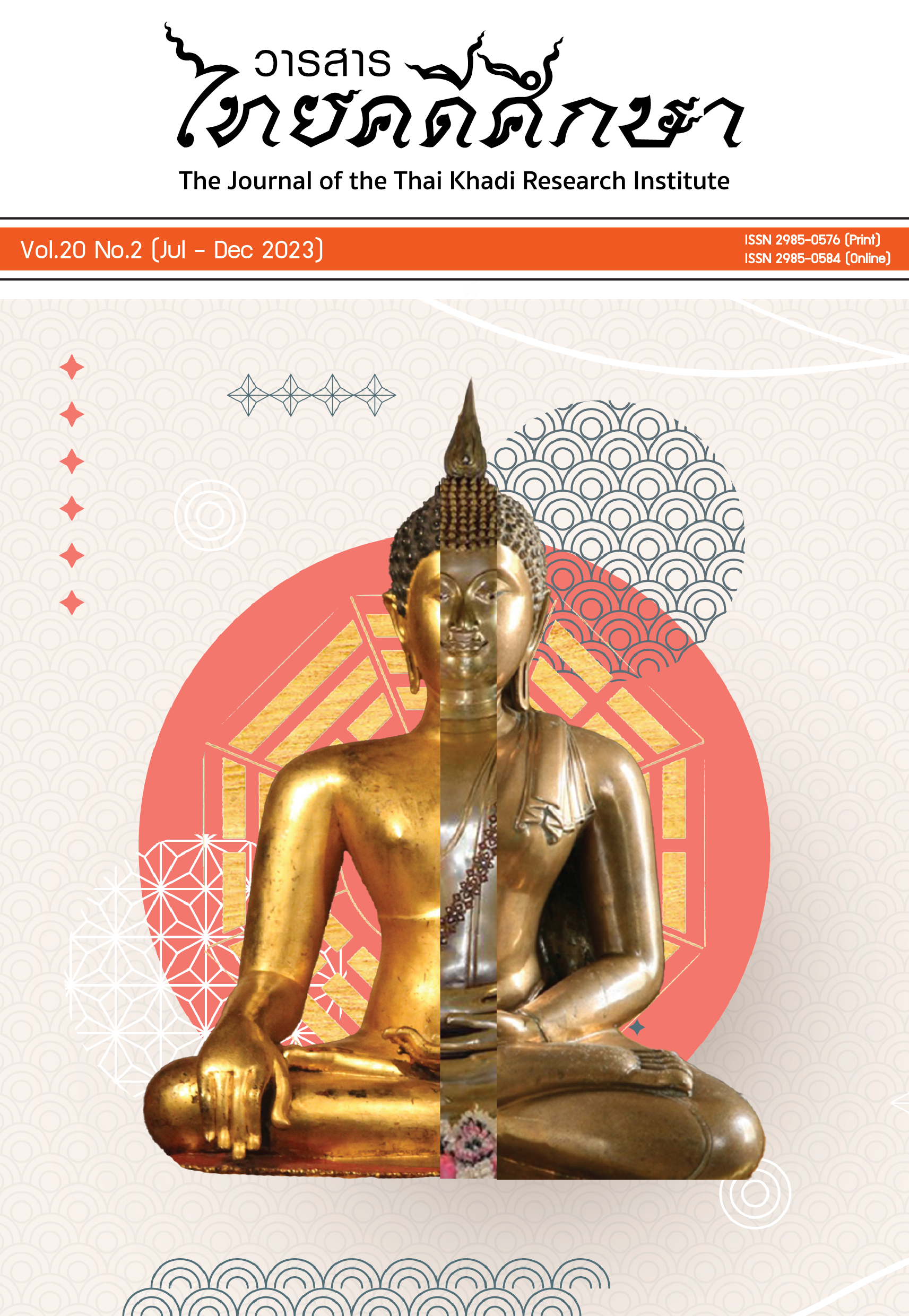อิทธิพลตะวันตกที่มีต่อการแสดง นาฏยศิลป์ไทย กรณีศึกษา ระบำเปลื้องผ้า ในช่วงสงครามโลกครั้งที่ 2 จนถึงปัจจุบัน (พ.ศ. 2564)
Main Article Content
บทคัดย่อ
การศึกษาในครั้งนี้งานวิจัยมีวัตถุประสงค์ คือ 1. ศึกษาประวัติความเป็นมา บริบท และความเชื่อมโยงจากอิทธิพลของชาติตะวันตกที่มีต่อการแสดงนาฏยศิลป์ไทย กรณีศึกษา ระบำเปลื้องผ้าในช่วงสงครามโลกครั้งที่ 2 จนถึงปัจจุบัน และ 2. ศึกษามุมมองเชิงศิลปะและภาพรวมในอุดมคติต่อกลุ่มการแสดงระบำเปลื้องผ้าในสังคมไทย ผู้วิจัยได้ทำการรวบรวมข้อมูลจากการศึกษาทางเอกสารในประเด็นที่เกี่ยวข้องและข้อมูลจากการสัมภาษณ์ผู้ที่เกี่ยวข้องกับงานวิจัย โดยได้ทำการวิเคราะห์ สังเคราะห์ ผ่านแนวคิดและทฤษฎีภาวะทันสมัย ทฤษฎีการแพร่กระจายทางวัฒนธรรม และแนวคิดหลังสมัยใหม่ ตามระเบียบวิธีวิจัยและได้ข้อค้นพบจากงานวิจัยอันนำมาสู่องค์ความรู้ในเชิงประวัติศาสตร์และเชิงศิลปะทางด้านนาฏยศิลป์
ผลการศึกษาพบว่า “ระบำเปลื้องผ้า” หรือการแสดงที่ผู้แสดงนุ่งห่มน้อยชิ้นที่เกิดขึ้นในสังคมไทยจัดเป็นวิถีการแสดงนาฏยศิลป์เพื่อความบันเทิงอีกรูปแบบหนึ่งในระดับราษฎร์ที่ได้พยายามปรับตัวให้เข้ากับสังคมที่เริ่มเข้าสู่ภาวะทันสมัยและสะท้อนให้เห็นถึงการแพร่กระจายทางวัฒนธรรมจากชาติตะวันตกที่เข้ามาในประเทศไทยตั้งแต่ช่วงสงครามโลกครั้งที่ 2 จนถึงปัจจุบัน (พ.ศ. 2564) รูปแบบการแสดงได้มีวิวัฒนาการและเกี่ยวข้องในแต่ละช่วงเหตุการณ์สำคัญทางประวัติศาสตร์ตามลำดับทำให้เกิดการแสดงใน 2 ลักษณะ คือ การแสดงที่รับรูปแบบเดิมมาจากตะวันตก และการแสดงที่ปรับให้เข้ากับวัฒนธรรมเดิมเพื่อทำให้มีความทันสมัยเป็นสากลและตอบสนองต่อพฤติกรรมความต้องการบริโภคของผู้คนตามกระแสโลกสมัยใหม่ มุมมอง “ระบำเปลื้องผ้า” ในมิติทางศิลปะด้านนาฏยศิลป์ให้ความหมายถึง การแสดงในอีกรูปแบบหนึ่งที่มีการสร้างสรรค์ การออกแบบ และมีองค์ประกอบทางการแสดง โดยสามารถพิจารณาได้จากองค์ประกอบ 3 ข้อแรก คือ 1. วัตถุประสงค์ของการสร้างงาน 2. สถานที่ที่จัดแสดง และ 3. กลุ่มผู้ชมที่ไม่ได้เสพความบันเทิงอันเกิดจากการชมงานเพียงอย่างเดียวแต่เพื่อศึกษาและรับสาร รวมทั้งรับรู้ถึงสุนทรียะอันเกิดจากงานนั้น ๆ ด้วย
Downloads
Article Details

อนุญาตภายใต้เงื่อนไข Creative Commons Attribution-NonCommercial-NoDerivatives 4.0 International License.
ผู้เขียนจะต้องลงนามในแบบฟอร์มรับรองบทความ เพื่อให้คำยืนยันความรับผิดชอบว่า บทความของผู้เขียนนั้นไม่เคยตีพิมพ์ที่ใดมาก่อน พร้อมรับทราบว่า กระบวนการส่งบทความเข้าพิจารณาและตีพิมพ์ในวารสารไทยคดีศึกษานั้น จะไม่มีการเรียกเก็บค่าใช้จ่ายในการดำเนินการ ยกเว้น ในกรณีที่ผู้เขียนขอยกเลิกการตีพิมพ์บทความในวารสารไทยคดีศึกษาไม่ว่าด้วยสาเหตุใด และหลังจากบทความนั้นเข้าสู่กระบวนการพิจารณาของผู้ทรงคุณวุฒิไปแล้ว ผู้เขียนจะต้องรับผิดชอบต่อค่าใช้จ่ายที่เกิดขึ้นในกระบวนการประเมินเป็นจำนวนเงิน 3,000 บาท (สามพันบาทถ้วน)
เอกสารอ้างอิง
Alcazar Cabaret Show Pattaya. (2022). Alcazar Show Pattaya. Retrieved June 9, 2020, from https://www.facebook.comalcazar cabaret show/?locale=pl_PL.
BuoLai Southeast Asia. (2016). Mor Lam Ploen, Mor Lam Kok Kha Khao. Retrieved December 10, 2020, from https://www.you tube. com/watch?v=lJNjWKLRqYE.
Makronmani, R. & Apichatbutphong, S. (2013). จ้ำบ๊ะ: วัฒนธรรมการกินน้ำแข็งไสของคนไทย [Jam Ba: Thai people's culture of eating shaved ice]. Suan Sunandha Rajabhat University: Perfect House.
Old pictures from the past (n.d.). Meechai Weeravaidya. Retrieved June 9, 2020, from https://www.facebook.com/groups/welove oldphoto.
Panchapak, A. (1976). ธุรกิจบนขาอ่อน [business on thighs]. Bangkok: Fueng Aksong.
Rachbanthitisthan. (1995). พจนานุกรมฉบับราชบัณฑิตยสถาน พ.ศ. 2525 [Royal Institute Dictionary, 1982]. Bangkok: Aksong Charoenthat.
Sonchumseing, H. (1969) อนุสรณ์งานฌาปนกิจศพนายหรั่ง (บุญศรี) สอนชุ่มเสียง [Cremation memorial for Mr. Rang (Boonsri) Son Chum Siang]. N.P.
The-peak. (2022), Pole Dancing. Retrieved June 9, 2020, from https://the-peak.ca/2022/02/pole-dancing-breaks-the-shackles-of-impending-prejudices/.
Three friends reading club. (2018). Dance of the Mahasane Theater Group. Retrieved June 3, 2020, from https://www.facebook. com/samgler.fan/?locale=th_TH.
Tnksiamtopic, (2019). Phetchaburi dance girl. Retrieved December 10, 2020, from https://www.tnksiamtopic.com/.
Tomorrowland. (2019). Coyote. Retrieved December 10, 2020, from https://tomorrowland.club/.
Virunrak, S. (2000). วิวัฒนาการนาฏยศิลป์ไทยในกรุงรัตนโกสินทร์ พ.ศ. 2325 - 2477 [Evolution of Thai dance in Rattanakosin, 1782 - 1934]. Bangkok: Chulalongkorn University Press.
Watcharasathian, Y. (1970). เกล็ดจากอดีต [Tales from the past]. Bangkok: Fueng Aksong.
Interviewees
Charasri, N. (2021, February 27). Chulalongkorn University.
Jongda, S. (2021, March 19). Bunditpatanasilp Institute Ministry of Culture.
Natayakul, S. (2021, January 18). Department of Performing Arts Mahasarakham University.


